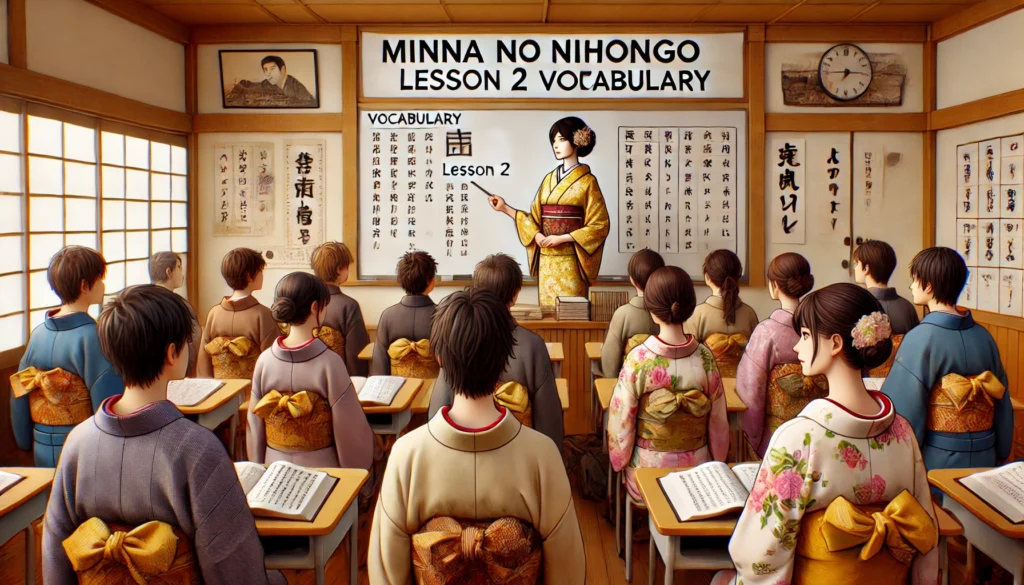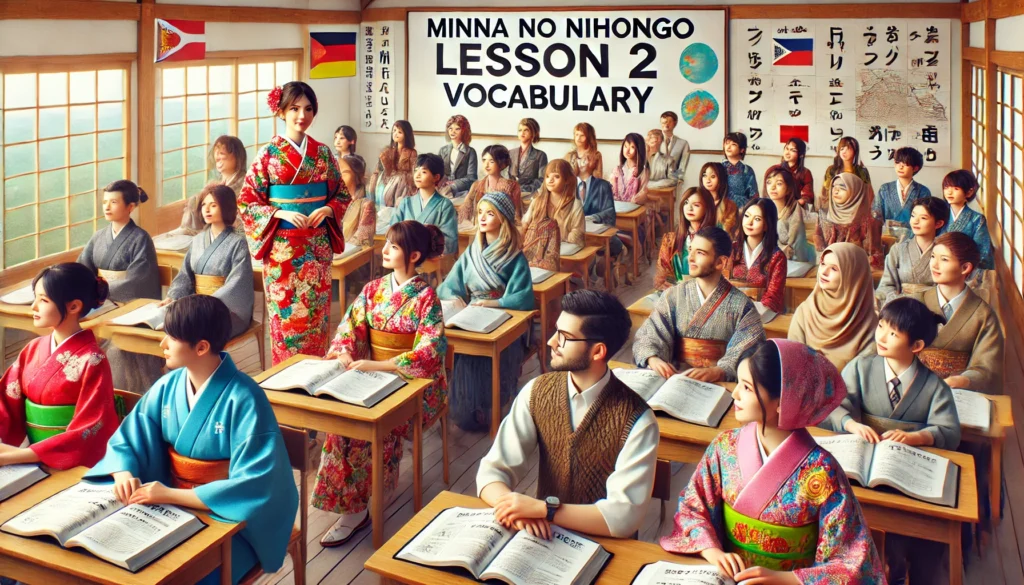Minna no Nihongo Lesson 2 Vocabulary: Lesson 2 focuses on vocabulary related to personal information, introductions, and basic interactions. These words are crucial for forming simple sentences and engaging in basic conversations in Japanese. Here’s a breakdown of some of the key vocabulary introduced in this lesson:
Minna no Nihongo Lesson 2 Vocabulary
| Hiragana | Romaji | English |
| これ | kore | This (near speaker) |
| それ | sore | Kono |
| あれ | are | That (far from both) |
| この〜 | kono | This ~ (specific object) |
| その〜 | sono | That ~ (specific object) |
| あの〜 | ano | That ~ (far, specific) |
| ほん | hon | Book |
| じしょ | Zasshi | Dictionary |
| ざっし | Shinbun | Magazine |
| しんぶん | shinbun | Newspaper |
| ノート | Noto | Notebook |
| てちょう | Techyou | Pocket notebook |
| めいし | Meishi | Business card |
| えんぴつ | Enpitsu | Pencil |
| かさ | Kasa | Umbrella |
| かばん | Kaban | Bag |
| とけい | Tokei | Clock / Watch |
| じどうしゃ | jidousha | Automobiles, Car |
| くるま | Kuruma | Car |
| つくえ | Tsukue | Desk |
| いす | isu | Chair |
| そうです | sou desu | That’s right |
| ちがいます | chigaimasu | That’s wrong |
| どうぞ | douzo | Please (offering) |
| どうも | | doumo | Thanks |
Read More: Minna no Nihongo Lesson 3 Vocabulary
Minna no Nihongo Lesson 2 Vocabulary Overview
1. Name-related Vocabulary
- 名前 (なまえ, namae) – Name
- This word is essential for talking about someone’s name. It is often used with the question word 何 (なん, nan), meaning “what.” For example:
- あなたの名前は何ですか? (あなたのなまえはなんですか, Anata no namae wa nan desu ka?) – What is your name?
- This word is essential for talking about someone’s name. It is often used with the question word 何 (なん, nan), meaning “what.” For example:
- 〜さん (〜san) – Mr./Ms./Mrs.
- This is a polite honorific used after a person’s name. It is commonly used to show respect when addressing others.
- 田中さん (たなかさん, Tanaka-san) – Mr./Ms. Tanaka
- This is a polite honorific used after a person’s name. It is commonly used to show respect when addressing others.
- 私 (わたし, watashi) – I, me
- A common pronoun used to refer to oneself. It is gender-neutral but more formal. Men may use different pronouns like 僕 (boku) in casual settings.
- 私の名前はジョンです (わたしのなまえはジョンです, Watashi no namae wa Jon desu) – My name is John.
- A common pronoun used to refer to oneself. It is gender-neutral but more formal. Men may use different pronouns like 僕 (boku) in casual settings.
- あなた (anata) – You
- This word means “you” and is used when referring to someone else. However, it is important to note that Japanese speakers often avoid using “you” directly, instead using the person’s name with an honorific.

2. Nationality and Language Vocabulary
- 〜人 (〜じん, jin) – Person (nationality)
- This suffix is used to indicate the nationality of a person. It is attached to the name of a country to say, “a person from (country).”
- アメリカ人 (アメリカじん, Amerika-jin) – American
- 日本人 (にほんじん, Nihon-jin) – Japanese
- 英国人 (えいこくじん, Eikoku-jin) – British
- This suffix is used to indicate the nationality of a person. It is attached to the name of a country to say, “a person from (country).”
- 日本語 (にほんご, Nihongo) – Japanese language
- This term refers to the Japanese language itself. It is important when talking about languages.
- 私は日本語を勉強しています (わたしはにほんごをべんきょうしています, Watashi wa Nihongo o benkyou shiteimasu) – I am studying Japanese.
- This term refers to the Japanese language itself. It is important when talking about languages.
- 英語 (えいご, Eigo) – English (language)
- This term refers to the English language.
- 私は英語を話します (わたしはえいごをはなします, Watashi wa Eigo o hanashimasu) – I speak English.
- This term refers to the English language.
3. Question Words and Basic Phrases
- 何 (なん, nan) – What
- A key question word used to ask about things, actions, or events.
- それは何ですか? (それはなんですか, Sore wa nan desu ka?) – What is that?
- A key question word used to ask about things, actions, or events.
- どこ (doko) – Where
- This word is used to ask about locations.
- 学校はどこですか? (がっこうはどこですか, Gakkou wa doko desu ka?) – Where is the school?
- This word is used to ask about locations.
- はい (hai) – Yes
- This is the word for “yes” and is often used in affirmative answers.
- はい、分かります (はい、わかります, Hai, wakarimasu) – Yes, I understand.
- This is the word for “yes” and is often used in affirmative answers.
- いいえ (iie) – No
- This is the word for “no,” used to give a negative response.
- いいえ、違います (いいえ、ちがいます, Iie, chigaimasu) – No, that’s not correct.
- This is the word for “no,” used to give a negative response.
4. Polite Expressions
- よろしくお願いします (よろしくおねがいします, Yoroshiku onegaishimasu) – Nice to meet you / Please take care of it
- This phrase is often used when making requests or at the end of introductions. It’s a polite way to say “Please take care of it,” or “I look forward to working with you.”
- 初めまして、ジョンです。よろしくお願いします (はじめまして、ジョンです。よろしくおねがいします, Hajimemashite, Jon desu. Yoroshiku onegaishimasu) – Nice to meet you, I am John. Please take care of it.
- This phrase is often used when making requests or at the end of introductions. It’s a polite way to say “Please take care of it,” or “I look forward to working with you.”
- どうぞ (douzo) – Please
- A polite way of offering something to someone. It can be used when giving something or inviting someone to take something.
- どうぞ、こちらへ (どうぞ、こちらへ, Douzo, kochira e) – Please, come this way.
- A polite way of offering something to someone. It can be used when giving something or inviting someone to take something.
5. Basic Adjectives and Phrases
- 学生 (がくせい, gakusei) – Student
- This word refers to a student, someone who is enrolled in a school or university.
- 私は学生です (わたしはがくせいです, Watashi wa gakusei desu) – I am a student.
- This word refers to a student, someone who is enrolled in a school or university.
- 会社員 (かいしゃいん, kaishain) – Company employee
- This word refers to someone who works for a company.
- 彼は会社員です (かれはかいしゃいんです, Kare wa kaishain desu) – He is a company employee.
- This word refers to someone who works for a company.
- 先生 (せんせい, sensei) – Teacher
- This is the word for teacher, used both for educators and sometimes as an honorific for professionals in other fields.
- 先生、質問があります (せんせい、しつもんがあります, Sensei, shitsumon ga arimasu) – Teacher, I have a question.
- This is the word for teacher, used both for educators and sometimes as an honorific for professionals in other fields.
2. Example Sentences
To help you understand how to use these vocabulary words in context, here are some sample sentences:
- 私はアメリカ人です。 (わたしはアメリカじんです, Watashi wa Amerika-jin desu) – I am American.
- あなたの名前は何ですか? (あなたのなまえはなんですか, Anata no namae wa nan desu ka?) – What is your name?
- これは日本語の本です。 (これはにほんごのほんです, Kore wa Nihongo no hon desu) – This is a Japanese book.
- 英語を話せますか? (えいごをはなせますか, Eigo o hanasemasu ka?) – Can you speak English?
Minna no Nihongo Lesson 2 Vocabulary Pdf
For practice, click here for the Minna no Niohongo Lesson 2 vocabulary PDF.

Grammar and Sentence Structures of Lesson 2
A. Demonstrative Pronouns
1. これ (kore), それ (sore), あれ (are)
These words refer to objects based on proximity:
This (near the speaker)
それ: That (near the listener)
あれ: That (far from both)
Example Sentences:
– これはほんです。(Kore wa hon desu.) This is a book.
– それはじしょですか?(Sore wa jisho desu ka?) Is that a dictionary?
– あれはなんですか?(Are wa nan desu ka?) — What is that?
2. この (kono), その (sono), あの (ano):
They are used with a specific noun to describe proximity.
このほん (*kono hon*) — This book
そのかばん (*sono kaban*) — That bag
あのいす (*ano isu*) — That chair
Example Sentences:
– このほんはわたしのです。(*Kono hon wa watashi no desu.*) This book is mine.
– そのじしょはだれのですか?(*Sono jisho wa dare no desu ka?*) Whose dictionary is that?
3. Teaching Materials
A. Flashcards
Create flashcards with:
The Japanese word (Hiragana/Katakana or Kanji).
– Romaji for pronunciation.
– English translation.
Use the flashcards for quick quizzes or review sessions.
B. Object Identification Game
Prepare real or printed pictures of the vocabulary items (e.g., books, bags, umbrellas).
Hold up an item and ask, “これはなんですか?” (*Kore wa nan desu ka?*).
Students reply: “これは______です。” (*Kore wa [object] desu.*).
C. Role-Playing Exercises
Pair students and have them role-play a simple dialogue:
– A: これはなんですか? (*Kore wa nan desu ka?*) — What is this?
– B: それはじしょです。(*Sore wa jisho desu.*) — That is a dictionary.
– A: そうですか。(*Sou desu ka?*) — Is that so?
D. Matching Exercise
Match vocabulary words to pictures or English translations.
4. Suggested Activities
A. Class Survey
Have students walk around the classroom, asking their classmates about various items.
Example question: *Kore wa nan desu ka?* (What is this?)
B. Labeling Game
Place labels with Japanese words on real objects around the classroom (e.g., *ほん* on a book, *かばん* on a bag).
Students walk around and identify the items by saying their names aloud.
C. Listening Practice
Play audio recordings of sentences using *kore, sore, are* and have students point to or hold up the correct objects.
D. Cultural Exploration
Teach students the polite way to give or receive items using phrases like:
*どうぞ* (*Douzo*) — Please, here you go.
*どうも* (*Doumo*) — Thanks.
5. Homework Suggestions
A. Vocabulary Practice**
Write each vocabulary word five times in Hiragana/Katakana.
Practice writing sentences using *これ, それ, あれ*.
B. Sentence Writing
Write 5 sentences introducing classroom objects, e.g.:
– これはつくえです。(*Kore wa tsukue desu.*)
– そのとけいはわたしのです。(*Sono tokei wa Watashi no desu.*)
C. Conversation Practice**
Practice a dialogue with a language partner at home or record yourself introducing items using the lesson vocabulary.
Conclusion
Minna no Nihongo Lesson 2 introduces important vocabulary that will serve as the foundation for everyday conversations in Japanese. By mastering these words, learners can talk about their name, nationality, and profession, and engage in basic interactions in Japanese. Keep practicing these words in sentences, and soon you’ll be able to participate in simple conversations confidently!